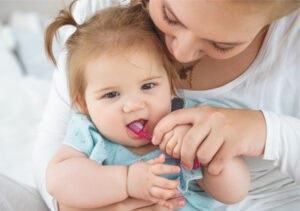By Dr. Amanda Rizner
 Oral care for infants and toddlers is essential in building a foundation for healthy teeth and gums as they grow. As general dentists, we often get many questions from parents regarding not only how, but why it is essential to take care of their child’s teeth even though they will eventually come out. Here are some key tips and guidelines to ensure proper oral hygiene for young children:
Oral care for infants and toddlers is essential in building a foundation for healthy teeth and gums as they grow. As general dentists, we often get many questions from parents regarding not only how, but why it is essential to take care of their child’s teeth even though they will eventually come out. Here are some key tips and guidelines to ensure proper oral hygiene for young children:
1) Brushing or wiping as soon as the first tooth comes in: A child’s first tooth appears around the age of 6 months. It is recommended parents wipe the gums and teeth of these infants before bedtime or after a nighttime feeding in order to ensure that the sugar from breastmilk or formula does not linger on teeth overnight. A washcloth can be used as the first teeth develop, and later on parents can switch to an infant/toddler toothbrush.
2) Brush with a remineralizing toothpaste: Up until recently, most children only the had the option to use a fluoridated toothpaste for all ages. If choosing to use a fluoridated toothpaste, it is recommended that children under three years who cannot spit properly, use a smear or grain sized amount of toothpaste. This can then be increased to a pea sized amount after three years of age or when the child can properly spit. This is recommended in order to decrease the amount of fluoride ingested. Recently, hydroxyapatite toothpastes have come onto the market which contain no fluoride and are safe if swallowed. This toothpaste has similar remineralizing properties as fluoride and can be used as soon as the first tooth erupts. It is recommended that parents supervise their children while brushing their teeth even when they are able to do so themselves for the recommended two-minute time period. Flossing is recommended as soon as the teeth start to touch, where food can begin to become impacted when eating.
3) Getting rid of the pacifier: The American Academy of Pediatric Dentistry (AAPD) generally recommends weaning children off pacifiers by age two to avoid long-term dental or oral health issues. Prolonged pacifier use, especially beyond age two, can impact the alignment of a child’s teeth and jaw, potentially leading to issues like an open bite or crossbite. Frequent pacifier use, especially if used all day, may delay speech development or lead to speech impediments. Most pediatric dentists recommend to lessen pacifier use gradually around six months, when infants can start self-soothing in other ways. Nighttime use is common in the first year, but daytime use can be reduced.
4) Thumbsucking habits: Like pacifier usage, thumbsucking is usually a common way for the child to soothe themselves. This habit, however, can lead to severe jaw malformations that may need to be corrected with orthodontic therapy, if not stopped early. Some children develop an “open-bite” due to this habit, which is essentially when the top jaw forms around the thumb, leading to the anterior teeth not being able to touch properly. Some malformations can self-correct if there is early intervention.
5) Why baby teeth are important: Some parents questions whether it’s essential to perform dental restorations or any type or restorative work on these teeth as they will eventually fall out when the child reaches their teenage years. Baby teeth or “deciduous” teeth provide space maintenance for the permanent teeth to erupt. If deciduous teeth were to be extracted too soon, it could lead to the permanent teeth not having enough room to erupt. Infection in the deciduous dentition could also lead to damage of the surrounding bone and future tooth buds. It is important that these teeth exfoliate as they are supposed to in order to have proper alignment of the permanent dentition.
Conclusion
With these tips, you can set a strong foundation for your child’s dental health and prevent many common oral health issues later in life.
(941) 529-0055
www.dentistryonfruitville.com









